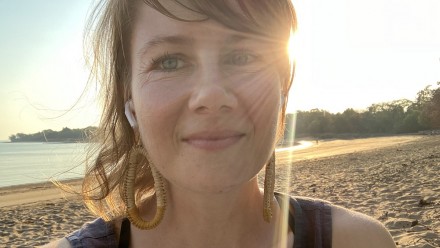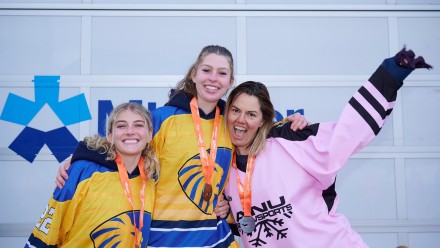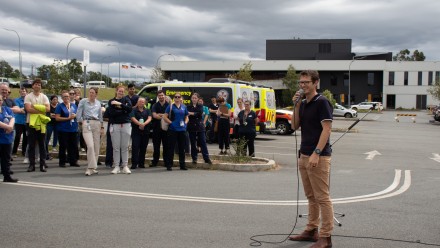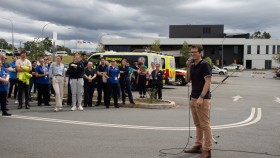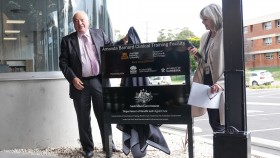Small beginnings...and lofty goals
By Associate Professor Dipti Talaulikar
It about a year ago that I checked to see if I had the phone number of Mr Jay Poria, International Relations Manager at the Australian National University, College of Health and Medicine, whom I had met just once before. This was during the peak of the Delta COVID-19 wave in India - and I was exhausted, worried sick and frustrated.
I am Dipti Talaulikar, a clinical and laboratory haematologist. I completed my haematology training in India at the Christian Medical College, before moving to Australia and retraining here. Like many of the Indian diaspora, especially from healthcare backgrounds, I too was inundated with phone calls from colleagues, friends, and family members, as India dealt with a tsunami of COVID-19 cases. I was reaching out to Jay to see if we could do better - help in a bigger way. Over a weekend, we brainstormed plans (patient support - not feasible; peer support to global colleagues - a big yes!), created a website outside of the ANU - and sent a memo to our Dean, Professor Russell Gruen asking ANU to support the initiative. I was not very optimistic - there were no other organisations, and certainly no universities supporting such initiatives. However, within 48 hours, Professor Gruen had approved the initiative, and on 12 May 2021, we moved the website to the ANU platform.
It was a simple premise - of matching demand and supply. Australia had hardly any COVID-19 cases then and healthcare professionals were keen to help. India had so many cases it was deploying medical students to the frontline, with no time to provide adequate training. The ANU COVID-19 Peer Support Program was created - there was a tab you could click if you wanted to volunteer, and another, if you wanted help. Jay and I were the 2-person team, fielding questions, connecting people and trouble-shooting - all while carrying our regular workloads. While it was exhausting work, it was heart-warming to see the volunteer support pouring in - we quickly built up a volunteer base of 220+ general practitioners, specialists, nurses, and allied health workers, and even administrators and IT professionals. A program that should have taken a year to plan and develop, was up and running in a weekend, with no funding or manpower, fuelled by goodwill and a determination to help.
We continued to grow organically, addressing requests for reliable education (to counter misinformation) by creating a weekly webinar series on COVID-related topics. There were no takers for the first one - so I volunteered. The talk on vaccination in patients with blood cancers was done on the fly - using a case-based format with panel members from India. We used the format as far as possible for the remaining 24 webinars! With no experience in creating or running webinars, I learnt on the job - getting a zoom account; creating a webinar zoom template, a webinar running sheet and script, learning how to “pin” speakers on the screen! I cannot thank Jay enough for his help - patiently walking an IT-illiterate through the myriad tasks.
Fortunately, we drew in like-minded people. Devashi Paliwal, a second year medical student, joined us in late June and offered to provide administrative support - and pulled in a host of other students. We soon had a wonderful core team of 20-25 staff and students supporting the program. A small amount of funding also materialised - the “what” and “how” usually sorts itself out when you have your “why”!
We have kept our “why” firmly in focus as we move into a post-COVID phase. Harnessing our considerable international networks from 38 countries, we are focussing on healthcare issues that have no place in the 21st century. We rebranded the program - and “The Link” was born! A planning day in January brought together 40 attendees from across the globe to brainstorm challenges and opportunities. We have 4 limbs in various stages of development - focussing on supporting and connecting medical students (Link and Share), women health professionals (Link and Grow) and those working in resource poor settings through education (Link and Learn) and frugal innovation (Link and Innovate).
Looking back at the year, it has been an amazing journey for me - drawing on internal resources I didn’t know I possessed. As clinicians and academics, we are often on the hamster wheel, running along trodden paths, wanting to…but not knowing how to contribute more. Thanks to the constant support and advice of mentors, supervisors, and colleagues, I was able to harness an amazing community of people to contribute in a meaningful and authentic way. Thank you to everyone who has helped us along the way - provided support, a kind word of advice. We have many plans for the future, but if the past year is anything to go by, I am sure we will get there!





